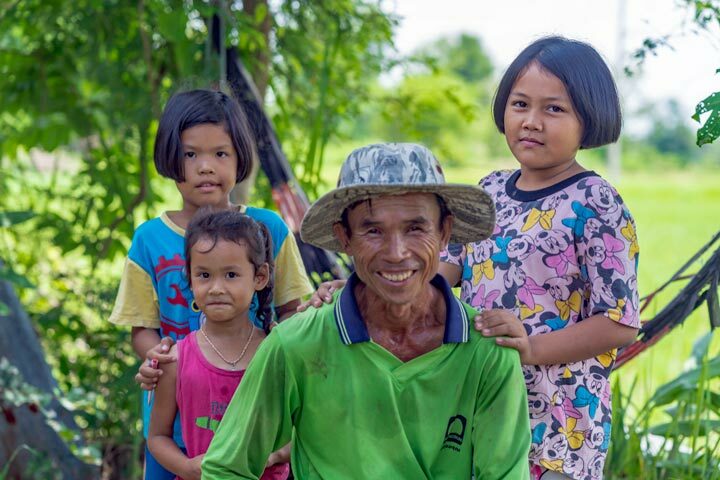
John And Penny / Shutterstock.com
Thai society is organized hierarchically. This is also reflected in family life. Grandparents and parents are at the top of the hierarchy and should always be treated with respect. This hierarchical structure is also practical and prevents conflicts.
Especially in rural Thailand, families are large and people live under one roof, sometimes with their grandparents. A clear structure is advisable. The Thai love and spoil children, but they are also quite strict with them. Children must know their place, behave politely and show respect. Parents expect them to continue displaying this behavior into adulthood.
Children must show respect for parents
Thai children are always respectful and grateful towards parents. They also find this quite normal because they have been raised lovingly by the parents and the parents have paid for the education of the child. A serious insult to Thai parents is a child who shows disrespect and is ungrateful. There is also a hierarchy based on age between brothers and sisters. The oldest sibling has more authority than a younger family member.
Brothers and sister in Thailand
Also in the Thai language, a distinction is made between older and younger family members. A few examples:
Mother = Mea
Father = Paw
A child addresses the parents with khun mea en khun paw (Mrs Mother and Mr Father)
An older brother = pee chai
An older sister = pee sau
A younger brother = nong chai
A younger sister = non sau
Children support the parents financially
Many children, sometimes even at the age of minors, leave the village of their birth to look for work in Bangkok. But whether they stay in the countryside or move to the city, a large part of the salary goes to the parents to support them financially.
Stay at home or take parents in
Eventually, most sons and/or daughters return to their native village to continue living close to their parents and to take care of them or take them in if necessary. It is also not uncommon for Thai young adults to continue to live in their parents' homes, even when they are old enough to lead their own lives. Daughters do not leave home until they are married. An unmarried woman living alone will fall prey to gossip and backbiting. Everyone in the village will say that she is no good and that she is probably a 'Mia Noi', a second wife or mistress of a rich man.
Children are the pension for elderly Thai
Thailand does not have a sound pension system as in the west. So parents are completely dependent on the support of their children. Retirement homes or nursing homes are therefore not a well-known phenomenon in Thailand. And even if they were there, children would not send their parents there. They see caring for the parents until death as a form of gratitude for the upbringing and the love they have received.


Small correction:
Mother = แม่ mâe: (falling tone)
Father = พ่อ phôh (falling tone)
A child addresses the parents with khoen mea and khoen paw (aspirated K). As a sign of respect you can also address the parents of friends, etc. with (khoen) phôh / mâe:.
An older brother = พี่ชา phîe chaaj (falling tone, middle tone)
An older sister = พี่สาว phîe sǎaw (falling tone, middle tone)
A younger brother = น้องชาย nóhng chai (high tone, mid tone)
A younger sister = น้องสาว nóhng sǎaw (high tone, mid tone)
And then there are a whole series of words for other family, for example there are separate terms for your mother's mother and your father's mother (while we call both grandmothers). Likewise with uncle, aunt, etc. The Thai have separate words for the father's and mother's side, and for someone who is young or older. Difficult!
From Ronald Schütte's booklet Thai Language, pages 51-52:
*ลูก – lôe:k – child – falling tone
หลาน – lǎan – grandchild, cousin (uncle) – rising tone
ป้า – pâa – aunt (older sister of parents) – falling tone
ลุง – loeng – uncle (parents' older brother) – middle tone
น้า – náa – aunt/uncle (mother's younger brother/sister) – high tone
อา – aa – aunt uncle (father's younger brother/sister) – middle tone
ปู่ – pòe: – grandfather (paternal side) – low tone, long oeee
ย่า – jâa – grandmother (paternal) – low tone
ตา – taa – grandfather (maternal side) – middle tone
ยาย – jaaj – grandmother (maternal side) – mid tone
An inverted caret -ǎ- is a rising tone Rob! Like how you ask a question. So Sǎaw in a questioning/rising tone.
Maybe I get a different text on my screen, but the piece doesn't say that someone is complaining, does it?
But to further expand on the comment, it is true that the care of the elderly in the Netherlands is bought off by collecting levies / taxes and then the finger can always be pointed at the government or trying to get respect with money.
Nice and easy and you can just sit in your own chair, even if it concerns your parents.